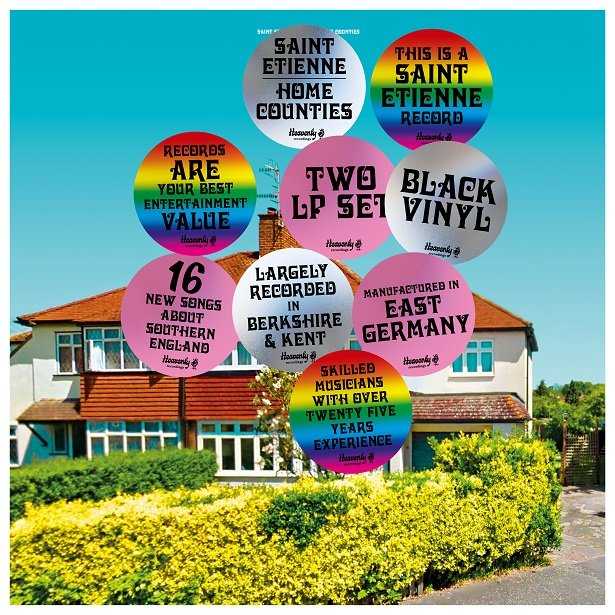St. Etienne enjoy something of an odd relationship with modernity; first emerging into the dizzy smorgasbord which surrounded acid-house with the less-than-having-it Only Love Can Break Your Heart, Bob Stanley, Pete Wiggs and Sarah Cracknell have never seemed so contemporary since, or looked comfortable other than when ensconcing their craft in the blanket of metropolitan suburbia.
Whether the trio’s vision of Britain – or more specifically London – has ever truly been realised is open to hours of post club, staying up-late-on-a-school-night debate, but over a career spanning nearly three decades their retro-ambience has remained the band’s most attractive quality, a technicolour amalgam that’s part scrap book, part second hand shop.
All three of the protagonists were made refugees in London, immigrants from less than exotic locales such as Chelmsford and Reigate, but having now removed themselves again outside of its mythical boundaries, Home Counties is a love letter to both the processes of dislocation and how we ourselves transform on those monotonous journeys, of how we become Jekylls or Hydes depending on the direction of the platform we’re standing on.
Recorded over 6 weeks in the capital with a small army of co-producers including Shawn Lee of Young Gun Silver Fox, Richard X and long-time collaborator Gerard Johnson, Home Counties’ generous roster of sixteen songs undoubtedly affords space to work some familiar tropes: regular listeners will for instance be less than surprised to hear the odd snatch of fuzzy, RP radio samples, the broadcaster’s lips stiff and upper in spite of the real world’s onslaught.
Less snug for instance though is the orthodox mirror ball schmaltz of Dive, as straighter line as perhaps the players have ever drawn to anything, or the slightly awkward bedsit prose of Train Drivers In Eyeliner.
Even this as criticism however feels a little rude, like putting your feet up on the opposite bus seat; Saint Etienne after all can seem so fragile, their ingredients being dreams both waking and denied, the sort of illusory gift which makes the recherché Cilla-isms of Whyteleafe so wistfully glorious. Moreover, whatever character she’s fondly method-sketching, Cracknell plainly knows her elfin voice has stretched a million stock broker’s belts, that trick of sounding both naïve and tantric simultaneously adorning the likes of What Kind Of World and After Hebden’s gently winding, beige MOR.
Based on the sum of just those parts the band’s ninth album would amount to a hip Father’s Day present to be wrapped up with a pair of driving gloves and some socks. But the trio, as they’ve shown over the years, remain far too deft to take the easy route of letting bygones define them. Some of the changes are minor tailoring – the shuffling break that carries Unopened Fan Mail being the most obvious example – but Heather’s weird Moog outliers delve deeper, the would be hedonists’ story emblematic of the syndrome Wiggs has described as “the love/hate relationship people have with ‘home’”.
Again, scratching beneath the surface calm, the Eastern tinged closer Angel Of Woodhatch possesses the kind of sweet travelogue minimalism which is well known to the faceless commuter. Fascinating as these are, the main course is unquestionably Sweet Arcadia, a love song to the prefab dormitory towns that sprang up around post-World War II London, concrete friezes where Wiggs and Stanley would frustratedly adolesce. Together with Cracknell’s knowing monologue, its lush cinematics score near eight minutes during which she and they channel their very essence, at once longing and belonging, hopeless romantics full of boundless cynicism.
The centrepiece of a record which defies easy categorisation, St. Etienne have again made yesterday’s music for tomorrow, a sound that on this evidence is here for a good time – and a long time.





